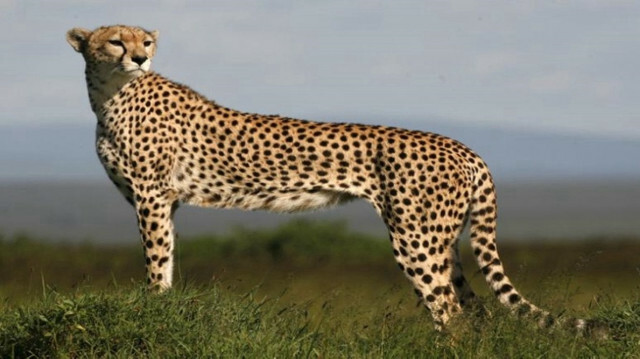
Experts express skepticism at government’s ambitious project to import cheetahs from South Africa to reintroduce them into Indian forests
As preparations are in full swing in a wildlife resort in central India to host the cheetah – the fastest land animal – once again, many experts have expressed skepticism about this ambitious project.
The cheetah was declared officially extinct in India in 1952 due to massive hunting and poaching.
After three decades, the cheetah is being reintroduced in the country with 12-14 of them being imported from South Africa, according to an action plan devised by Environment, Forest, and Climate Change Ministry.
Speaking to Anadolu Agency, Jasbir Singh Chouhan, a top wildlife official in Madhya Pradesh state in central India, which has been identified as one of the sites for reintroducing the cheetah, said preparations are in full swing to welcome the wild animal into the country once again.
"Everything is in place, we in Madhya Pradesh have a long history. We have done translocation projects in the past and we have been successful. Field preparation we are doing. All possible things that are expected out of us, we are doing," he said.
He also said that at the beginning there would be less than 10-12 cheetahs and they will be supplemented every year.
The first cheetah in the world to be bred in captivity was in India during the rule of the Mughal emperor Jahangir in the 16th century.
According to government officials, the cheetah is the only large carnivore to have become extinct in Independent India, and the only option to introduce them was to procure them from abroad.
- Putting horse before the cart
K. Ullas Karanth, leading Indian tiger expert and director of the Centre for Wildlife Studies in southern Bangalore city, told Anadolu Agency that maintaining a viable breeding population of say 100-200 wild cheetahs would require setting aside 5,000-10,000 square kilometers (19,00-3,860 square miles) of habitat.
“It needs to be packed with natural prey such as antelopes, and devoid of humans, cattle, dogs, and other major large predators such as wolves, hyenas, and leopards. Trying to introduce a handful of cheetahs, without creating necessary space is an effort doomed to fail," he said.
Karanth said that another potential habitat of a wild cheetah in the western state of Rajasthan is being encroached by wind and solar power projects, besides irrigation systems.
"In the best of cheetah habitats in Africa, only 5% of cheetahs survive to establish themselves and reproduce," he said, adding that it was essential to first create the necessary habitat for the wild animal.
"Right now, they are putting the cart before the horse in a ride that will go nowhere," he said.
Valmik Thapar, an Indian naturalist and conservationist, said that the African cheetah can never be introduced into the wilds of India.
"We don’t have any habitat to ensure a natural reintroduction. We do not have the prey species nor the space for the cheetahs to grow in numbers. I think you can reintroduce cheetahs in a fenced enclosure of 100-200 sq km (38-77 sq mi) with an expenditure of millions of dollars because the fence has to be four meters high," he told a local English daily this month.
- Need to involve the local population
Officials however said they have taken on board several experts who have given a green signal for the success of the project.
"Healthy criticism is always welcome. But all the cheetah experts, we have invited from South Africa are of the opinion, that there is no reason why cheetahs shouldn't succeed here," said Chouhan.
"They have seen the area, and the preparation and they do not doubt that we shouldn't be doing it. It is an ambitious project,” he said.
Madhya Pradesh-based wildlife activist Ajay Dubey told Anadolu Agency that the "dignified participation" of local villagers is needed for the success of the program.
"The success lies in the positive response of the nearby villages around the identified park. The governments need to take them on board. The government needs to be honest with the conversation of the Cheetah successful and for that support of local villagers is a must," he added.

